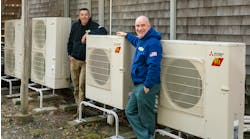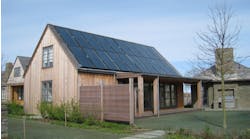Latest from Solar
Heat Pumps Get Us to Net Zero
Sponsored
FRESNO, CALIF. — Grundfos Pumps Corp. recently announced that it will voluntarily cut in half the amount of potable water used to irrigate its 27-acre campus here during 2011, with plans to eliminate the practice entirely by the end of 2012.
As a result, the global pumps and pumping systems manufacturer will save roughly 3 million gallons (of potable water) during 2011, enough to fill four Olympic sized swimming pools. In 2013, the facility plans for all campus irrigation to be supplied by reclaimed water.
Water is one of the most precious resources in the San Joaquin Valley, and therefore conservation is crucial to the region's economic prosperity and sustainability, said David Mortensen, senior vice president of finance and quality manager for Grundfos. "The reduction of the amount of water used by the Grundfos Fresno facility increases the amount of water that is available for use by the local community."
To achieve a reduction of this scale the company will redesign its entire campus master plan. This will include a replacement plan for water-wise trees, shrubs and plant species; a new smart irrigation system; and water harvesting systems and techniques to replace existing potable water.
"We want to demonstrate that conserving scarce resources is not a sacrifice; and can still yield a lush, flowering, enjoyable environment for our employees and the greater Fresno community," said Mortensen, who is responsible for the environmental work at Grundfos in Fresno. "As a company that specializes in the design and manufacture of energy-efficient products, it is incumbent upon us to demonstrate that sustainability reaches beyond pumps and profits, and has positive impacts to our community and environment."
The plan bolsters existing sustainability programs already in place at the 180,000-sq.ft. manufacturing facility, which has already achieved a 30% reduction in energy use per unit of output since 2000. Other energy-saving initiatives include the addition of a seven-acre solar array, use of energy-efficient lighting, air compressors, pumps, fans and low-flow plumbing fixtures.
The effort is part of a corporate-wide sustainability initiative that seeks to reduce CO2 emissions, energy consumption and hazardous waste levels.
Water-conscious campus design
The new campus landscape plan will leverage a water-wise design, which focuses on the use of plant material that consumes less water and that is more appropriate to the Valley's demanding climate.
"The beauty of the landscape does not have to be sacrificed to save water," said Mortensen. "We want to demonstrate that beautiful landscaping and water conservation can go hand-in-hand."
While aesthetically pleasing, the current landscape design, like so many corporate and institutional campuses, is not conducive to water conservation, explained landscape consultant Scott Mears, president of Fresno-based Designlab 252, who helped Grundfos create a water-conscious campus.
"The Grundfos Campus currently consumes nearly 6 million gallons of potable water annually," said Mears. "In contrast, the new master plan proposes increasing the landscape area while reducing water demand by more than 83% through the selection of more regionally appropriate trees, shrubs and plants."
In addition to reworking the site's planting design, plans call for the replacement of the existing irrigation system, because it does not meet the requirements for efficient water application. The latest generation of smart irrigation controllers utilizes prevailing weather conditions, current and historic rates of evaporation and plant transpiration, and other relevant factors to adapt the watering schedule to meet the plants' actual water needs.
"The old system applied water in zones to a variety of plant material in an indiscriminant manner," said Mears. "In many areas, the irrigation system was putting much more water on the ground than the plants could use."
Data to support the smart irrigation controllers are already used to coordinate the facility's seven acres of photovoltaic panels that follow the sun's course throughout the day to maximize electricity production.
Installed in 2008, the 1.1-megawatt PV system generates nearly 40% of the Grundfos plant's annual electrical consumption. The solar array reduces CO2 emissions generated at the site by almost 2.4 million pounds annually, which is the equivalent to removing close to 200 cars from California's highways each year.
The water conservation initiative will also include a bio collection system to reclaim, treat and reuse rainwater to irrigate the new water-wise landscape. A four-acre water detention basin is planned to collect enough recycled water to support the external water needs of the entire campus, about the size of 21 football fields, without the use of any potable water. A bio-swale system will help filter the water prior to its entering the detention basin.
"Using reclaimed water for landscape irrigation boosts the potable water supply for drinking, cooking, bathing, clothes washing, and other household and commercial purposes," explained Mortensen.
Grundfos Pumps Corp. is committed to operating its business in an environmentally sustainable way. The following are additional sustainable initiatives at its Fresno, Calif., campus:
-Water conserving plumbing: Low-flow plumbing fixtures, including waterless urinals, high-efficiency toilets and faucets, are expected to save hundreds of thousands of gallons of potable water starting in 2011.
-Reduced water in manufacturing: The Fresno facility is also working to reduce water usage in its production process, as well as cooling towers, washers and testing tanks.
Grundfos worldwide initiatives are:
CO2 emission reduction: As a global entity, Grundfos seeks to limit CO2 emissions to 2008 levels. Despite the company's single greatest increase in production, the organization achieved a 2% reduction in CO2 emissions during 2010.
Corporate energy reduction: The company's sustainable buildings program goals include by 2012, no domestic water may be used for irrigation; by 2015 the consumption of fossil-based energy will be reduced by 30%; by 2015 the reuse of grey wastewater and rainwater harvesting will contribute at least 30% of the water consumption at all existing Grundfos buildings.
Related Articles:
Grundfos Pumps Corp. boosts water supply for Fresno residents, growers
Related Articles:
Grundfos awarded Supplier of the Year by Lochinvar for 2010

